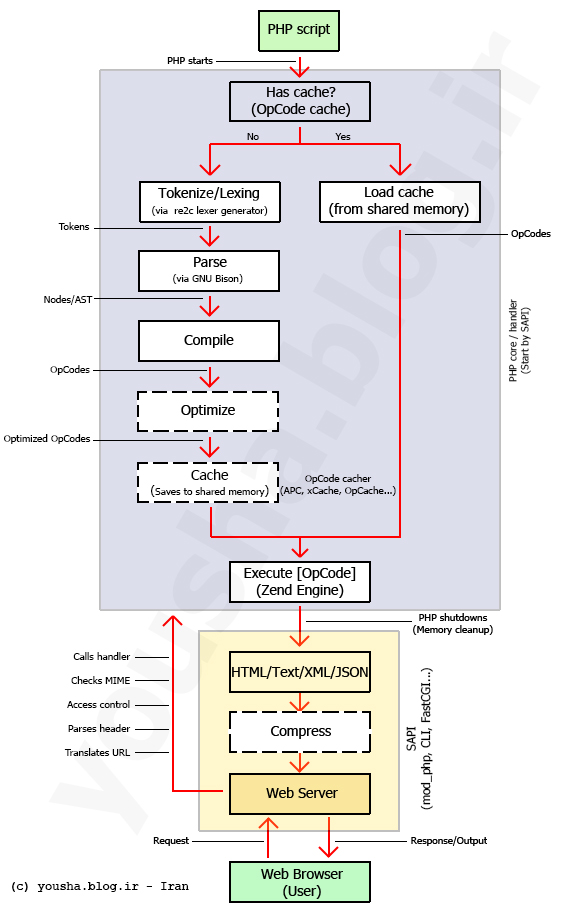How does PHP works and what is its architecture ?
The biggest difference between a Java web server and PHP is that PHP doesn't have its own built-in web server. (Well, newer versions do, but it's supposed to be for testing only, it's not a production ready web server.) PHP itself is basically one executable which reads in a source code file of PHP code and interprets/executes the commands written in that file. That's it. That's PHP's architecture in a nutshell.
That executable supports a default API which the userland PHP code can call, and it's possible to add extensions to provide more APIs. Those extensions are typically written in C and compiled together with the PHP executable at install time. Some extensions can only be added by recompiling PHP with additional flags, others can be compiled against a PHP install and activated via a configuration file after the fact. PHP offers the PEAR and PECL side projects as an effort to standardise and ease such after-the-fact installs. Userland PHP code will often also include additional third party libraries simply written in PHP code. The advantage of C extensions is their execution speed and low-level system access, the advantage of userland code libraries is their trivial inclusion. If you're administering your own PHP install, it's often simple enough to add new PHP extensions; however on the very popular shared-host model there's often a tension between what the host wants to install and what the developer needs.
In practice a web service written in PHP runs on a third party web server, very often Apache, which handles any incoming requests and invokes the PHP interpreter with the given requested PHP source code file as argument, then delivers any output of that process back to the HTTP client. This also means there's no persistent PHP process running at all times with a persistent state, like Java typically does, but each request is handled by starting up and then tearing down a new PHP instance.
While Java simply saves persistent data in memory, data persistence between requests in PHP is handled via a number of methods like memcache, sessions, databases, files etc.; depending on the specific needs of the situation. PHP does have opcode cache addons, which kind of work like Java byte code, simply so PHP doesn't have to repeat the same parse and compile process every single time it's executing the same file.
Do keep in mind that it's entirely feasible to write a persistent PHP program which keeps running just like Java, it's simply not PHP's default modus operandi. Personally I'm quite a fan of writing workers for specific tasks on Gearman or ZMQ which run persistently, and have some ephemeral scripts running on the web server as "frontend" which delegate work to those workers as needed.
If this sounds like a typical PHP app is much more of a glued-together accumulation of several disparate components, you'd be correct. Java is pretty self-contained, except for external products like RDBMS servers. PHP on the other hand often tends to rely on a bunch of third party products; which can work to its advantage in the sense that you can use best-of-breed products for specific tasks, but also requires more overhead of dealing with different systems.
This is how does PHP work:
(one of the best over the Internet)
